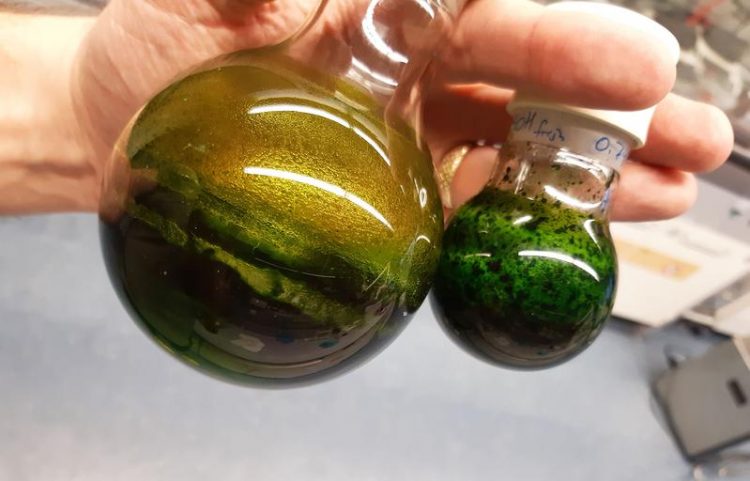Artemisia annua to be tested against COVID-19

Artemisia annua extracts Kerry Gilmore
Currently, there are no effective treatments against COVID-19. Medications commonly used against malaria or Ebola, as well as antiviral drugs, are being considered for repurposing. Herbal treatments used in Traditional Chinese Medicine were explored to treat coronavirus infections during the SARS-CoV and MERS-CoV outbreaks.
Initial studies in China showed the alcoholic extract of sweet wormwood (Artemisia annua) was the second most potent herbal medicine used on the 2005 SARS-CoV.
“I am excited about the international collaboration of academic and private sector scientists to conduct cell study testing of Artemisia annua against coronavirus.” said Professor Peter H. Seeberger, Director at the Max Planck Institute of Colloids and Interfaces in Potsdam.
COVID-19 is caused by severe acute respiratory syndrome coronavirus-2 (SARS-CoV-2), a positive-sense single-stranded RNA virus that is contagious in humans. Like the SARS-related coronavirus strain implicated in the early 2000’s SARS outbreak, SARS-CoV-2 is a member of the same subgenus.
SARS-CoV-2 is unique among known beta-coronaviruses in its incorporation of a polybasic cleavage site, a characteristic known to increase pathogenicity and transmissibility in other viruses.
“Given the similarities between those two viruses, plant extracts and artemisinin derivatives need to be tested against the new coronavirus and this international collaboration makes it possible,” continued Prof. Seeberger.
The cell study testing will be conducted in research institutions in Denmark and Germany with the plant extract from Artemisia annua and pure derivatives isolated from the plant such as artemisinin.
Treatments containing an artemisinin derivative, artemisinin-based combination therapies (ACTs), are now standard treatments worldwide for malaria. Artemisia annua extracts show very little toxicity and artemisinin-based drugs are widely used to treat malaria even in newborns.
ArtemiLife Inc., a US based company, is providing the necessary plant material for the studies. “We've been studying Artemisia annua and cultivating our fields with agriculture experts in Kentucky over the past few years. We’re privileged to have the opportunity to collaborate with the Max Planck Institute of Colloids and Interfaces in these studies,” said Adam J. Maust, ArtemiLife Inc. CEO.
Max Planck Institute for Colloids and Interfaces
The Max Planck Institute of Colloids and Interfaces was founded in 1992 and is divided into four departments (Biomaterials, Biomolecular Systems, Colloid Chemistry, Theory & Bio-Systems).
Current research topics include polymeric films, membranes, organic and inorganic nanostructures, microcapsules, biomineralization, nano- and microreactors, molecular motors and filaments, and the chemistry and biology of carbohydrates. The Biomolecular Systems Department has been studying, inter alia, the production and use of artemisinin and its derivatives for almost a decade.
https://www.mpikg.mpg.de/en
ArtemiLife Inc.
ArtemiLife Inc. is developing and planning to commercialize Artemisia annua-based products. ArtemiLife Inc. blends cutting edge science with pesticide-free growing and US-based production techniques, ArtemiLife Inc. is launching a range of teas and coffees supplemented with Artemisia annua.
https://artemilife.com/
Media Contact
All latest news from the category: Life Sciences and Chemistry
Articles and reports from the Life Sciences and chemistry area deal with applied and basic research into modern biology, chemistry and human medicine.
Valuable information can be found on a range of life sciences fields including bacteriology, biochemistry, bionics, bioinformatics, biophysics, biotechnology, genetics, geobotany, human biology, marine biology, microbiology, molecular biology, cellular biology, zoology, bioinorganic chemistry, microchemistry and environmental chemistry.
Newest articles

First-of-its-kind study uses remote sensing to monitor plastic debris in rivers and lakes
Remote sensing creates a cost-effective solution to monitoring plastic pollution. A first-of-its-kind study from researchers at the University of Minnesota Twin Cities shows how remote sensing can help monitor and…

Laser-based artificial neuron mimics nerve cell functions at lightning speed
With a processing speed a billion times faster than nature, chip-based laser neuron could help advance AI tasks such as pattern recognition and sequence prediction. Researchers have developed a laser-based…

Optimising the processing of plastic waste
Just one look in the yellow bin reveals a colourful jumble of different types of plastic. However, the purer and more uniform plastic waste is, the easier it is to…



